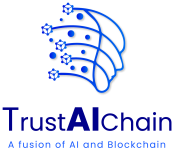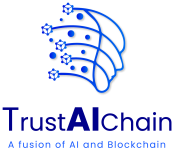While AI revolutionizes how we process information and make decisions, Blockchain introduces a new paradigm of trust and transparency through decentralized networks. The Fusion of AI and Blockchain holds immense potential to transform various sectors and exceptionally decentralized trust.

What is Decentralized Trust?
Decentralized trust is a trust model that operates without a central authority or intermediary. Instead of relying on a single entity to verify and authenticate transactions, decentralized trust systems distribute trust across a network of nodes, making it more resilient, transparent, and secure.
At the heart of decentralized trust is blockchain technology, which serves as a decentralized ledger that records transactions across a network of computers. Blockchain ensures that transactions are secure, transparent, and immutable without intermediaries through cryptographic techniques and consensus mechanisms.
Benefits of Decentralized Trust
Transparency:Decentralized trust systems promote transparency by allowing anyone to view the transactions recorded on the Blockchain. This transparency fosters accountability and reduces the risk of fraud and corruption.
Security:By distributing trust across a network of nodes, decentralized systems are inherently more secure than centralized counterparts. Cryptographic techniques ensure that transactions are tamper-proof and resistant to hacking attacks.
Resilience: Decentralized trust systems are highly resilient to single points of failure. Unlike centralized systems that can be vulnerable to outages or cyber-attacks, decentralized networks continue to operate even if individual nodes fail or are compromised.
Autonomy: Decentralized trust empowers individuals by giving them greater control over their assets and data. Users no longer rely on third parties to manage transactions, resulting in greater autonomy and self-sovereignty.
Lower Costs:By eliminating the need for intermediaries, decentralized trust systems can significantly reduce transaction costs. It mainly benefits cross-border transactions, where traditional financial intermediaries impose hefty fees.

Examples of Decentralized Trust
Cryptocurrencies:The most well-known example of decentralized trust is Bitcoin and other cryptocurrencies. These digital assets operate on decentralized blockchain networks, allowing users to send and receive payments without a central authority like a bank.
Smart Contracts: Ethereum and other blockchain platforms have popularized the concept of smart contracts, self-executing contracts with the terms of the agreement directly written into code. Smart contracts enable trustless transactions, automating the execution of agreements without the need for intermediaries.
Decentralized Finance (DeFi): DeFi platforms leverage decentralized trust to revolutionize the traditional financial system. From decentralized exchanges (DEXs) to lending protocols and yield farming, DeFi offers a wide range of financial services without relying on banks or other intermediaries.
Supply Chain Management:Decentralized trust can enhance supply chain transparency and traceability by recording every transaction on a blockchain. It ensures that all parties involved can verify the authenticity and provenance of goods, reducing the risk of counterfeit products and improving accountability.
Identity Management: Decentralized identity solutions leverage blockchain technology to give individuals greater control over their data. Users can selectively disclose their information without relying on centralized identity providers by storing identity information on a decentralized ledger.
Enhanced Security:By combining the cryptographic security of Blockchain with AI-driven threat detection and anomaly detection algorithms, AI and Blockchain Fusion strengthen the security posture of decentralized systems. This synergy can mitigate risks such as hacking attacks, fraud, and data breaches, ensuring the integrity and confidentiality of transactions.
Improved Scalability: One of the challenges faced by Blockchain networks is scalability, particularly in processing large volumes of transactions. AI and Blockchain address this challenge by leveraging AI algorithms for efficient data processing, consensus mechanisms, and network optimization, enabling Blockchain networks to scale more effectively while maintaining performance and reliability.
Predictive Analytics: AI-powered predictive analytics can analyze vast amounts of data stored on the Blockchain to identify patterns, trends, and insights. This capability enables proactive decision-making, risk management, and optimization of processes in decentralized systems, enhancing operational efficiency and performance.
Smart Contract Automation:Smart contracts, self-executing contracts with predefined terms encoded on the Blockchain, can be enhanced with AI capabilities for automated execution and enforcement. AI algorithms can analyze external data sources, trigger contract clauses based on predefined conditions, and execute transactions autonomously, reducing the need for manual intervention and streamlining processes.
Personalized Services: By analyzing user data stored on the Blockchain, AI algorithms can provide customized services and recommendations tailored to individual preferences and behavior. This personalization enhances user experience, engagement, and satisfaction in decentralized applications and platforms, fostering loyalty and trust among users.
Fraud Detection and Prevention: AI-powered fraud detection algorithms can analyze transactional data on the Blockchain to detect suspicious activities, anomalies, and fraudulent behavior in real-time. This proactive approach to fraud detection enhances security and trust in decentralized systems, mitigating financial losses and reputational damage.
Data Privacy and Consent Management: AI-driven privacy-preserving techniques can be integrated with Blockchain to enhance data privacy and consent management. AI and Blockchain Fusion enable secure and compliant data sharing while preserving user privacy and confidentiality by leveraging techniques such as federated learning, differential privacy, and zero-knowledge proofs.

Use Cases of AI and Blockchain Fusion in Decentralized Trust
Decentralized Finance (DeFi): In decentralized finance, AI and Blockchain Fusion can enhance risk assessment, automated trading, and decentralized asset management. AI-powered algorithms can analyze market data, predict price movements, and optimize investment strategies, enabling more efficient and profitable DeFi platforms.
Supply Chain Management: AI and Blockchain Fusion can revolutionize supply chain management by improving transparency, traceability, and efficiency. AI algorithms can analyze supply chain data stored on the Blockchain to optimize inventory management, predict demand, and detect counterfeit products, ensuring the integrity and authenticity of goods throughout the supply chain.
Healthcare: AI and Blockchain Fusion can facilitate secure and interoperable health data exchange, personalized treatment recommendations, and predictive analytics for disease prevention. By leveraging Blockchain for data integrity and AI for data analysis, healthcare providers can deliver more effective and personalized care while preserving patient privacy and confidentiality.
Identity Management: AI and Blockchain Fusion can enhance decentralized identity management by providing secure and user-centric solutions. AI algorithms can analyze biometric data, behavioral patterns, and contextual information stored on the Blockchain to verify identities, detect identity theft, and enable seamless authentication across various applications and services.
Energy Trading: In the energy sector, AI and Blockchain can enable peer-to-peer energy trading, demand forecasting, and grid optimization. AI algorithms can analyze energy consumption patterns, renewable energy production data, and market dynamics to facilitate efficient energy trading and distribution on decentralized energy platforms.

In Summary
As we journey into the future of technology, the convergence of AI and Blockchain Fusion holds the promise of revolutionizing decentralized trust across various industries. AI and Blockchain Fusion enable more resilient, efficient, and trustworthy decentralized systems by harnessing AI’s strengths for data analysis, decision-making, and automation while leveraging Blockchain’s security and transparency. As organizations and innovators continue to explore the potential of AI and Blockchain Fusion, we are poised to unlock new opportunities, drive innovation, and create a more transparent and inclusive digital economy.
�
�







